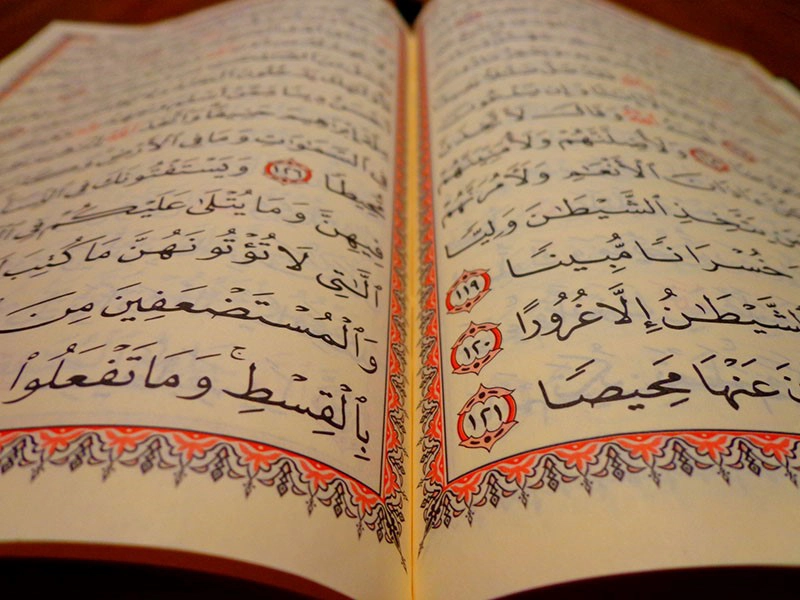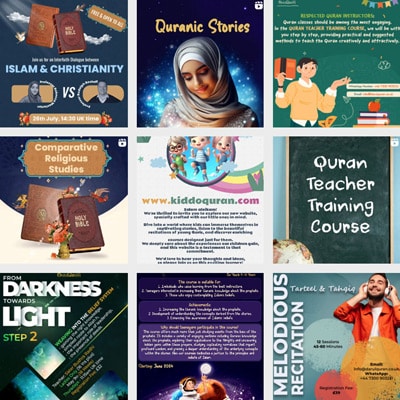A servant would not perfect the reality of faith at all except that he has three qualities: reflecting about religion, well planning in life, being patient with calamities.
Ali ibn Musa al-Rida (as)
Table of Contents
ToggleThe Sacred Quran, the holy book of Islam, is replete with references to the Prophet Muhammad, describing his attributes and roles in various contexts. This article delves into the various names and attributes of the Prophet Muhammad as depicted in the Holy Quran, highlighting their significance and the underlying messages they convey.
The Names of the Prophet Muhammad in the Noble Quran
The Prophet Muhammad is mentioned by name only four times in the Grand Quran. These instances underscore the profound respect and reverence accorded to him.
- Muhammad: This name appears in Quran in the following verses:
- Surah Al Imran (3:144): “Muhammad is but a messenger; messengers have passed on before him…”
- Surah Muhammad (47:2): “But those who believe and do righteous deeds and believe in what has been sent down upon Muhammad – and it is the truth from their Lord…”
- Surah Al-Fath (48:29): “Muhammad is the Messenger of Allah; and those with him are forceful against the disbelievers, merciful among themselves…”
- Surah Al-Ahzab (33:40): “Muhammad is not the father of any of your men, but he is the Messenger of Allah and the last of the prophets…”
- Ahmad: This name appears once in the Glorious Quran:
- Surah As-Saff (61:6): “And [mention] when Jesus, the son of Mary, said, ‘O children of Israel, indeed I am the messenger of Allah to you confirming what came before me of the Torah and bringing good tidings of a messenger to come after me, whose name is Ahmad.'”
Attributes of the Prophet Muhammad in the Heavenly Quran
The Sacred Quran attributes several titles and characteristics to the Prophet Muhammad, emphasizing his noble qualities and the critical role he plays in the divine plan. Some of these attributes include:
- Servant (Abd): The concept of being a servant or ‘Abd in Islam is deeply rooted in the teachings of the Holy Quran and the example set by the Prophet Muhammad. In Islamic tradition, being a servant means being humble, compassionate, and obedient to Allah. The Noble Quran describes the Prophet Muhammad as the “abd” or servant of Allah, highlighting his humility and devotion to Allah.
One of the key attributes of the Prophet Muhammad as a servant is his humility. Despite being the leader of the Muslim community, he always remained humble and preferred to lead a simple and modest life. Quran describes him as a mercy to all mankind, emphasizing his compassion and kindness towards others. The Prophet Muhammad’s humility and compassion served as a guiding example for his followers, teaching them the importance of humility and servitude towards Allah.
Another important attribute of the Prophet Muhammad as a servant is his obedience to Allah. The Heavenly Quran emphasizes the importance of submitting to Allah’s will and following His guidance. The Prophet Muhammad followed the teachings of Quran faithfully and set an example for his followers to do the same. His obedience to Allah was unwavering, even in the face of adversity and persecution. The Prophet Muhammad’s steadfastness in his faith and his unwavering devotion to Allah served as an inspiration for his followers to also strive for obedience and servitude to Allah.
The concept of being a servant or ‘Abd is central to Islam, as it emphasizes the importance of humility, compassion, and obedience to Allah. The Prophet Muhammad exemplified these qualities in his life, serving as a role model for Muslims around the world. His humility, compassion, and obedience to Allah continue to inspire Muslims to strive towards being better servants of Allah.
Surah Al-Isra (17:1): “Exalted is He who took His Servant by night from al-Masjid al-Haram to al-Masjid al-Aqsa…”

- Messenger (Rasul): This attribute underscores his role as the conveyor of Allah’s message. One of the primary functions of the Messenger is to communicate the revelations of Allah to the people. This includes conveying the teachings of Quran, as well as providing guidance and instructions on how to live a pious and righteous life. The Messenger acts as a conduit between Allah and the believers, transmitting His commands and laws to ensure that they are followed and obeyed.
In addition to conveying the message of Allah, the Messenger also serves as a role model for the believers. They are tasked with exemplifying the teachings of Islam in their own lives, demonstrating through their actions and behavior what it means to be a true servant of Allah. The Messenger is expected to embody the virtues of compassion, humility, integrity, and piety, inspiring others to follow their example and strive for righteousness.
Furthermore, the Messenger acts as a mediator between Allah and the people, interceding on behalf of the believers and seeking forgiveness and mercy for their sins. Through their prayers and supplications, the Messenger helps to bridge the gap between humanity and the divine, fostering a closer relationship between the two and facilitating the process of repentance and redemption.
Surah Al-Baqarah (2:151): “Just as We have sent among you a messenger from yourselves reciting to you Our verses…”
- Prophet (Nabi): The title of Nabi highlights his role as one who receives divine revelation.
Surah Al-Ahzab (33:45): “O Prophet, indeed We have sent you as a witness and a bringer of good tidings and a warner.”
Mercy to the Worlds (Rahmatan lil-‘Alamin): The concept of being Mercy to the Worlds (Rahmatan lil-‘Alamin) is a fundamental attribute of the Prophet Muhammad as described in the Holy Quran. This attribute reflects the compassionate and merciful nature of the Prophet towards all creation, regardless of their faith or background. Quran emphasizes the importance of mercy and compassion in the teachings of Islam, and the Prophet Muhammad exemplified this through his actions and words.
One of the key verses in the Noble Quran that highlights the Prophet’s role as a mercy to the worlds is found in Surah Al-Anbiya, verse 107: “And We have not sent you, [O Muhammad], except as a mercy to the worlds.” This verse emphasizes the universal message of mercy that the Prophet brought to all of humanity, not just to Muslims. The Prophet Muhammad’s mission was to spread peace, compassion, and justice to all people, regardless of their beliefs or practices.
Throughout his life, the Prophet demonstrated mercy and compassion in his interactions with others. He was known for his kindness, generosity, and forgiveness towards those who wronged him. He treated everyone with respect and dignity, regardless of their social status or background. The Prophet was particularly compassionate towards the poor, the needy, and the marginalized in society, and he emphasized the importance of caring for the less fortunate.
The Prophet Muhammad’s teachings also emphasized the importance of forgiveness and reconciliation. He encouraged his followers to forgive those who wronged them and to seek reconciliation with their enemies. The Prophet believed that forgiveness and mercy were key to building strong and harmonious relationships with others, both within the Muslim community and beyond.
In addition to his compassionate nature, the Prophet Muhammad was also known for his wisdom and guidance. He provided moral and ethical teachings that continue to resonate with Muslims around the world. The Prophet’s teachings on justice, equality, and compassion have inspired countless individuals to strive for a better, more just society based on the principles of mercy and compassion.Surah Al-Anbiya (21:107): “And We have not sent you, [O Muhammad], except as a mercy to the worlds.”

- Warner (Nadhir) and Bearer of Glad Tidings (Bashir): These Prophet Muhammad, peace be upon him, is regarded as the Warner (Nadhir) and the Bearer of Glad Tidings (Bashir) in Quran. These attributes highlight his role as a messenger of Allah, tasked with conveying the message of Islam to humanity. The Holy Quran describes Prophet Muhammad as a Warner who warns people of the consequences of their actions and urges them to seek guidance from Allah. At the same time, he is also a Bearer of Glad Tidings, delivering the good news of Allah’s mercy and forgiveness to those who believe and follow His commandments.
As a Warner, Prophet Muhammad played a crucial role in alerting people to the dangers of straying from the path of righteousness. In numerous verses of the Grand Quran, he is depicted as warning disbelievers and sinners of the punishment that awaits them if they do not repent and turn back to Allah.
For example, in Surah Al-A’raf, Allah commands Prophet Muhammad to warn his people of the Day of Judgment, where they will be held accountable for their deeds:”Say, [O Muhammad], ‘I am only a warner, and there is no deity except Allah, the One, the Prevailing. Lord of the heavens and the earth and whatever is between them, the Exalted in Might, the Perpetual Forgiver.
‘” (Quran, 38:65-66)Prophet Muhammad’s role as a Bearer of Glad Tidings is equally important, as he brings hope and reassurance to those who believe in Allah and follow His commandments.
In Surah Al-Ahqaf, Allah describes the believers as those who receive glad tidings of Paradise from their Lord and are rewarded with everlasting bliss:”And those who believed and did righteous deeds will be admitted to gardens beneath which rivers flow, abiding eternally therein by permission of their Lord; and their greeting therein will be, ‘Peace!'” (Quran, 46:15) Prophet Muhammad’s dual role as a Warner and Bearer of Glad Tidings exemplifies his compassion and concern for the well-being of humanity. He tirelessly conveyed the message of Islam, calling people to righteousness and guiding them towards the path of salvation. His teachings continue to serve as a source of guidance and inspiration for Muslims around the world, reminding them of their duty to heed the warnings of Allah and embrace the glad tidings of His mercy and forgiveness.
Surah Al-Baqarah (2:119): “Indeed, we have sent you, [O Muhammad], with the truth as a bringer of good tidings and a warner…”
The Prophet’s Exemplary Character in the Glorious Quran
The Sacred Quran frequently emphasizes the impeccable character of the Prophet Muhammad, setting him as a model for all believers to emulate.
- Possessor of Great Moral Character (Khuluqin ‘Azim): His ethical and moral standards are described as exemplary.
- Surah Al-Qalam (68:4): “And indeed, you are of a great moral character.”
- Guide (Hadi) and Light (Nur): The Prophet is depicted as a source of guidance and illumination for those who seek the path of righteousness.
- Surah Al-Ma’idah (5:15): “There has come to you from Allah a light and a clear Book.”
- Witness (Shahid): This attribute underscores his role as a witness to the truth and the deeds of his followers.
- Surah Al-Ahzab (33:45): “O Prophet, indeed We have sent you as a witness and a bringer of good tidings and a warner.”

The Prophet’s Relationship with the Believers
The Holy Quran highlights the deep and compassionate relationship the Prophet Muhammad has with his followers.
- A Brother and Protector: In Islam, Prophet Muhammad is not just seen as a messenger of Allah, but also as a brother and protector to the believers. His relationship with the believers is one of utmost importance, as he is seen as the exemplar of the perfect human being and the ultimate role model for Muslims.
Prophet Muhammad’s relationship with the believers is defined by compassion, love, and guidance. He cared deeply for his followers, treating them as his own family members. He would listen to their problems and offer them solace and advice. He would always put the needs of the community above his own, sacrificing his own comfort for the well-being of his followers.
As a protector, Prophet Muhammad took on the responsibility of ensuring the safety and security of the believers. He would stand up against injustice and oppression, even if it meant facing persecution and hardship himself. He would defend the rights of the vulnerable and marginalized, and would never hesitate to speak out against tyranny and cruelty.
Prophet Muhammad’s relationship with the believers was based on mutual respect and trust. He valued the opinions and contributions of his companions, seeking their counsel on important matters. He treated them as equals, regardless of their social status or background, and encouraged them to strive for excellence in all aspects of their lives.
Prophet Muhammad’s relationship with the believers was characterized by humility and selflessness. Despite his status as a prophet and leader, he never sought fame or glory for himself. Instead, he always directed the praise and adulation towards Allah, reminding the believers to be grateful for the blessings bestowed upon them.
- Surah Al-Tawbah (9:128): “There has certainly come to you a Messenger from among yourselves. Grievous to him is what you suffer; [he is] concerned over you and to the believers is kind and merciful.”
- An Exemplar (Uswah Hasana): The Prophet Muhammad’s relationship with his followers was characterized by compassion, kindness, patience, and empathy. He treated everyone with respect and dignity, regardless of their social status or background. He listened to their concerns, offered them support and guidance, and always made them feel valued and appreciated. This approach to relationships is something that all Muslims strive to emulate in their own lives.
- One of the key aspects of the Prophet’s relationship with his followers was his ability to lead by example. He did not just preach about the importance of kindness and compassion; he lived it every day. His actions spoke louder than words, and his followers were inspired by his example to be better individuals themselves. This is a powerful lesson for all of us, reminding us that our actions can have a profound impact on those around us.
- The Prophet Muhammad also emphasized the importance of unity and solidarity among believers. He stressed the importance of working together as a community, supporting one another in times of need, and standing up for justice and equality. By fostering a sense of brotherhood and sisterhood among his followers, the Prophet created a strong and resilient community that was able to overcome any challenge.
Another key aspect of the Prophet’s relationship with his followers was his ability to forgive and show mercy. Even when faced with hostility and opposition, he always responded with kindness and forgiveness.
This attitude of forgiveness and compassion is something that all Muslims are encouraged to cultivate in their own lives, as it is a fundamental aspect of Islamic teachings.
o Surah Al-Ahzab (33:21): “There has certainly been for you in the Messenger of Allah an excellent pattern for anyone whose hope is in Allah and the Last Day…”
In conclusion the Grand Quran offers a profound and multifaceted portrayal of the Prophet Muhammad, highlighting his unique status and the qualities that make him an exemplary leader, guide, and messenger.
His names and attributes, as depicted in the sacred text, provide a deep insight into his role and the immense respect he commands within the Islamic faith. Through these descriptions, believers are encouraged to reflect on his exemplary character and strive to emulate his virtues in their own lives.

















